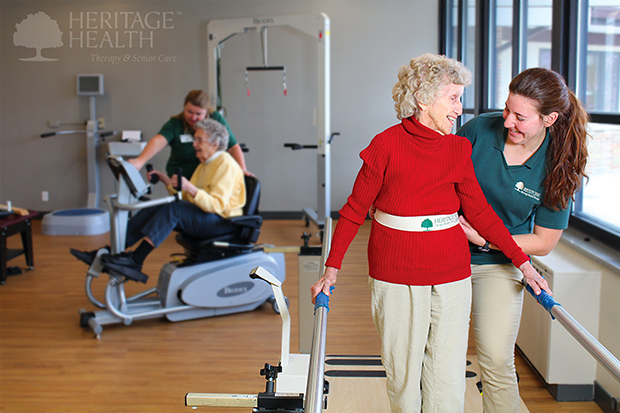
Submitted by Heritage Health Chillicothe
Many seniors find they are in need of rehabilitative therapy services following surgery or after suffering an injury. Short-term therapy services are designed to restore activities of daily living so patients can return home quickly and with confidence. Comprehensive therapy services can include physical, occupational, and speech therapy programs, and are designed to specifically meet each patient’s needs and goals.
Physical Therapy: Gait Training & Balance Improvement
Physical therapy can help seniors strengthen their gait and restore their balance. Patients with hip and knee joint replacements, leg arthritis or fractures, peripheral neuropathy, stroke, and muscular sclerosis may benefit from physical therapy. Patients receiving therapy can expect increased ankle and leg strength, more natural coordination and self-confidence during walking, as well as faster speeds of walking for greater distances.
To improve balance and better manage potential falls, physical therapy patients learn what factors contribute to their imbalance and which can increase the likelihood of a fall. Typical outcomes of patient participation include increased flexibility and mobility, better balance control and greater confidence in the ability to avoid falls. Patients experiencing dizziness, loss of sight or hearing, general weakness, joint pain, strokes, and Parkinson’s disease may benefit from a physical therapy evaluation and treatment.
Occupational Therapy: Relearning Activities of Daily Living
Occupational therapy patients, with the supervision of a therapist, practice tasks that help them regain their activities of daily living. Tasks like working in the kitchen, doing laundry, and getting in and out of bed on their own can become challenging after surgery or an injury. Even something as simple as turning a faucet can become difficult. Skills that may have been lost are regained and strengthened through practice with the therapy staff. The practical application of these therapy exercises ensures that the patient will be able to care for themselves when they return home.
Speech Therapy: Swallowing Disorders & Parkinson’s Disease
Speech Therapy is often helpful in the condition referred to as dysphagia (swallowing disorders). Patients may experience difficulty swallowing and may have pain while swallowing. Sometimes the individual may be completely unable to swallow or may have trouble swallowing liquids, foods, or saliva. Eating is difficult and, often, it can be difficult to take in enough calories and fluids to nourish the body and weight loss is a common observation. Therapy may include muscle exercises, improving head posture, designing a safe diet, and teaching safe swallowing techniques.
To learn more about our therapy services designed specifically for seniors, please contact Missy Herridge, community relations coordinator, at Heritage Health in Chillicothe. Call or email her at 309-274-2194, or mherridge@HeritageOfCare.com. Learn more online at HeritageOfCare.com/Chillicothe.
Photo credit: Susan Chiang/iStock
